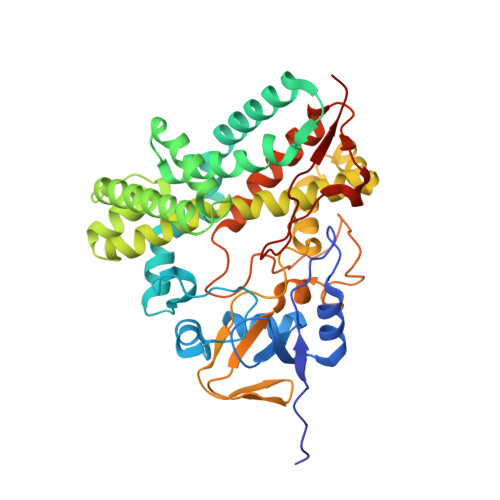The role of Ile87 of CYP158A2 in oxidative coupling reaction.
Zhao, B., Bellamine, A., Lei, L., Waterman, M.R.(2012) Arch Biochem Biophys 518: 127-132
- PubMed: 22203090
- DOI: https://doi.org/10.1016/j.abb.2011.12.007
- Primary Citation of Related Structures:
3TZO, 5DE9 - PubMed Abstract:
Both CYP158A1 and CYP158A2 are able to catalyze an oxidative C-C coupling reaction producing biflaviolin or triflaviolin in Streptomyces coelicolor A3(2). The substrate-bound crystal structures of CYP158A2 and CYP158A1 reveal that the side chain of Ile87 in CYP158A2 points to the active site contacting the distal flaviolin molecule, however, the bulkier side chain of Lys90 in CYP158A1 (corresponding to Ile87 in CYP158A2) is toward the distal surface of the protein. These results suggest that these residues could be important in determining product regiospecificity. In order to explore the role of the two residues in catalysis, the reciprocal mutants, Ile87Lys and Lys90Ile, of CYP158A2 and CYP158A1, respectively, were generated and characterized. The mutant Ile87Lys enzyme forms two isomers of biflaviolin instead of three isomers of biflaviolin in wild-type CYP158A2. CYP158A1 containing the substitution of lysine with isoleucine has the same catalytic activity compared with the wild-type CYP158A1. The crystal structure of Ile87Lys showed that the BC loop in the mutant is in a very different orientation compared with the BC loop in both CYP158A1/A2 structures. These results shed light on the mechanism of the oxidative coupling reaction catalyzed by cytochrome P450.
Organizational Affiliation:
Department of Biochemistry, Vanderbilt University School of Medicine, Nashville, TN 37232-0146, USA. bin.zhao@vanderbilt.edu
















